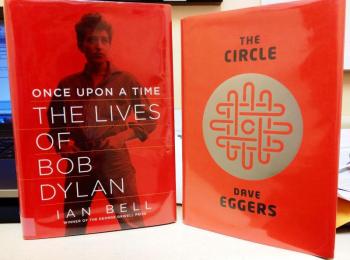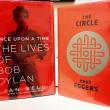A Dylan biography and Dave Egger’s ‘The Circle’
Two books crossed my sleepless eyelids over the past week or so, one a “1984” rerun for the Internet age, the other a fascinating and deftly written biography. One I can recommend, the other only partly.
“Once Upon A Time: The Lives of Bob Dylan,” by Ian Bell, is an in-depth examination of one of America’s most iconic figures of the past half century. Dylan unpacked his guitar in 1961 in Greenwich Village, the epicenter of the folk music revival, at the age of 19. The folk scene was overseen by a cadre of folk purists, and anyone who stepped outside that approval was suspect as a traitor to “the people.”
But Dylan was focused purely on the music, and was not a party line man. Despite his many “protest” anthems, such as “Blowin’ In The Wind,” “Masters of War,” and “The Times They Are A Changin’,” Dylan is best known for hisgroundbreaking hits accompanied by electric guitar, such as “Like A Rolling Stone,” “Positively 4th Street,” and “Stuck Inside of Mobile with the Memphis Blues Again.”
Such music had never been heard before, as Dylan synthesized rock, R&B and folk to create a wholly unique musical language. But many viewed him through the prism of the folk protest era and he struggled for years to extricate himself from its straightjacket. “Once Upon A Time” is a great work of musical biography and opens up to the reader not only the genius of Bob Dylan, but also allows a look into the culture of the musical and political world of the 1960s. I highly recommend it.
“The Circle” by Dave Eggers is a dystopian reflection on the culture of the Internet as seen through the fictional Internet giant The Circle Company. Modeled, no doubt, on Google and Facebook, “The Circle” examines what any Internet company with access to such vast amounts of data could (does?) mean to those it touches. The premise is a good one, but the execution is flawed.
The female protagonist, Mae, a 22-year-old who is thrilled to be hired by the “coolest” company in the world, lacks any ability to examine herself and her motives, making her a challenge to care about.
This makes the story feel like you would if a relative stayed too long on a visit. This cardboardish character development runs throughout the book. Mae is drawn inexorably deeper and deeper into the belief system of The Circle, as emotional connection to her former life recedes further and further into the distance.
The principal problem with the book is twofold, its writing is too often jejune, and the lack of honestly drawn characters fails to connect with the reader. To its credit the subject matter is serious and deserves a good writer’s examination. Eggers is a good writer, but here I’m afraid the circle has been broken. Recommended, with a caveat emptor.
Event Date
Address
United States
























